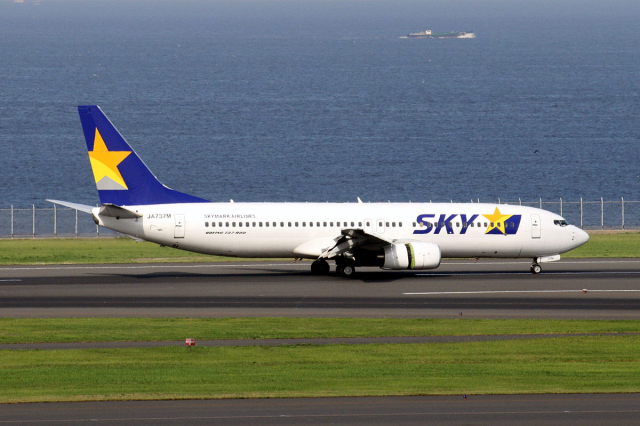
Air carrier has stuck with its airport OS for longer than just about any private PC user.
Skymark Airlines might not be as well-known as Japan’s two largest carriers, Japan Airlines and All Nippon Airlines, but it’s still Japan’s biggest air travel provider outside the JAL and ANA corporate umbrellas. As a machinery-reliant company in an advanced economy, you’d probably expect Skymark to be on the technological cutting edge in each and every aspect of its business, but Japanese traveler and Twitter user @imogine0000 recently learned otherwise.
After arriving at the airport to hop a Skymark flight to his destination, @imogine0000 headed to the carrier’s bank of self-check-in terminals. However, before he could complete the process a glitch occurred, and the terminal had to shut itself down. As the system began to reboot @imogine0000 recognized the DOS/V startup screen, and figured Skymark’s check-in terminals were probably running on Windows 10, but it turned out his guess was way off…like almost two decades off.
スカイマークがシステムトラブルのため搭乗手続き停止中
— わかばちゃんねる (@imogine0000) January 14, 2020
再開しますって時にチェックイン端末に表示された起動画面がDOS/V機のブート画面だったんでWindows10かな?って思ってたら出てきた画面が予想の斜め下
今日は、Windows7最期の日なんですが… pic.twitter.com/iRGeCJ2gxq
It turns out that Japan’s largest independent air carrier, at least at the airport @imogine0000 was flying out of, still runs Windows XP for its self-check-in machines. For those of you who haven’t memorized the family tree of Microsoft’s operating system, Windows XP was released all the way back in 2001, and was pushed aside with the introduction of Windows Vista in 2007. Windows XP is five generations older than the current standard, Windows 10, and Microsoft officially ended support for the system six years ago. Heck, the day @imogine0000 sent his tweet, January 14, was also the day that service ended for Windows 7, the successor to XP’s successor Vista.
But while plenty of people were surprised to see the practically ancient OS rise from the dead like this, other commenters could feel a certain logic in the situation.
“There are a lot of internal business devices that still run on XP. Sometimes I see them when I’m at hospitals. Basically as long as you don’t need the terminal to connect to the Internet, it works just fine.”
“If it’s not connecting to the Internet, there aren’t any additional security risks from using XP, so it’ll do the job.”
“XP is a fine OS. I still run it on my non-online connected PC.”
“No problem there. I still have a PC I run Windows 2000 on, and it works fine and dandy.”
But even if Skymark could continue using Windows XP, why would it? The popular theory is tied to the company’s status as a low-cost carrier. Skymark can’t compete with JAL and ANA in terms of luxury or the number of routes/planes it flies, and instead attracts customers by offering much more affordable tickets. In turn, it needs to stay focused on keeping operating costs down, and upgrading every self check-in terminal it’s already installed in airports across the country would be a major expense. So as long as using old tech isn’t presenting any risks to passenger safety, security, or convenience, Skymark appears to be taking the philosophy of “If it’s not broken, why fix it?”, which isn’t an entirely shocking school of thought regarding technology in Japan.
Source: Twitter/@imogine0000 via Hachima Kiko
Top image: Wikipedia/Shacho0822
● Want to hear about SoraNews24’s latest articles as soon as they’re published? Follow us on Facebook and Twitter!

 Pikachu learns how to fly as Japan’s new Pokémon airliner takes fight
Pikachu learns how to fly as Japan’s new Pokémon airliner takes fight Japanese airline thanks passengers during coronavirus slump with a special message 【Photos】
Japanese airline thanks passengers during coronavirus slump with a special message 【Photos】 JAL system makes air travel easier and lets you keep laptops, liquids in bag for security check
JAL system makes air travel easier and lets you keep laptops, liquids in bag for security check JAL voted most reliable airline in the world
JAL voted most reliable airline in the world Is new “One Piece” plane awesome fan service or just a cynical cash grab?
Is new “One Piece” plane awesome fan service or just a cynical cash grab? Foreigner’s request for help in Tokyo makes us sad for the state of society
Foreigner’s request for help in Tokyo makes us sad for the state of society Seaside scenery, history, and so many desserts on Yokohama’s Akai Kutsu【Japan Loop Buses】
Seaside scenery, history, and so many desserts on Yokohama’s Akai Kutsu【Japan Loop Buses】 Japan’s summertime towelket pillowcases are even better with the addition of Ghibli stars【Photos】
Japan’s summertime towelket pillowcases are even better with the addition of Ghibli stars【Photos】 Mikado Coffee is a 76-year-old coffee chain with a major celebrity connection
Mikado Coffee is a 76-year-old coffee chain with a major celebrity connection Is the all-you-can-eat KFC buffet in Tokyo really as good as they say it is?
Is the all-you-can-eat KFC buffet in Tokyo really as good as they say it is? How to properly eat a traditional Japanese tonkatsu meal
How to properly eat a traditional Japanese tonkatsu meal You COULD eat a terrifying octopus egg in Japan, but SHOULD you? Let’s find out!【Taste test】
You COULD eat a terrifying octopus egg in Japan, but SHOULD you? Let’s find out!【Taste test】 Japanese ramen restaurants under pressure from new yen banknotes
Japanese ramen restaurants under pressure from new yen banknotes Hey, Japanese taxi driver! Take us to your favorite restaurant in Tsuruga City!
Hey, Japanese taxi driver! Take us to your favorite restaurant in Tsuruga City! Sony Closes Plant in Gifu Prefecture, More than 1,000 Out of Work
Sony Closes Plant in Gifu Prefecture, More than 1,000 Out of Work McDonald’s new Happy Meals offer up cute and practical Sanrio lifestyle goods
McDonald’s new Happy Meals offer up cute and practical Sanrio lifestyle goods French Fries Bread in Tokyo’s Shibuya becomes a hit on social media
French Fries Bread in Tokyo’s Shibuya becomes a hit on social media Red light district sushi restaurant in Tokyo shows us just how wrong we were about it
Red light district sushi restaurant in Tokyo shows us just how wrong we were about it New private rooms on Tokaido Shinkansen change the way we travel from Tokyo to Kyoto
New private rooms on Tokaido Shinkansen change the way we travel from Tokyo to Kyoto Tokyo Tsukiji fish market site to be redeveloped with 50,000-seat stadium, hotel, shopping center
Tokyo Tsukiji fish market site to be redeveloped with 50,000-seat stadium, hotel, shopping center Japanese city loses residents’ personal data, which was on paper being transported on a windy day
Japanese city loses residents’ personal data, which was on paper being transported on a windy day Beautiful Ghibli sealing wax kits let you create accessories and elegant letter decorations【Pics】
Beautiful Ghibli sealing wax kits let you create accessories and elegant letter decorations【Pics】 Secret Kitchen bento serves Japanese flowers, birds, wind and moon in a box, but is it worth it?
Secret Kitchen bento serves Japanese flowers, birds, wind and moon in a box, but is it worth it? New definition of “Japanese whiskey” goes into effect to prevent fakes from fooling overseas buyers
New definition of “Japanese whiskey” goes into effect to prevent fakes from fooling overseas buyers Our Japanese reporter visits Costco in the U.S., finds super American and very Japanese things
Our Japanese reporter visits Costco in the U.S., finds super American and very Japanese things Studio Ghibli releases Kiki’s Delivery Service chocolate cake pouches in Japan
Studio Ghibli releases Kiki’s Delivery Service chocolate cake pouches in Japan All-you-can-drink Starbucks and amazing views part of Tokyo’s new 170 meter-high sky lounge
All-you-can-drink Starbucks and amazing views part of Tokyo’s new 170 meter-high sky lounge More foreign tourists than ever before in history visited Japan last month
More foreign tourists than ever before in history visited Japan last month New Pokémon cakes let you eat your way through Pikachu and all the Eevee evolutions
New Pokémon cakes let you eat your way through Pikachu and all the Eevee evolutions Disney princesses get official manga makeovers for Manga Princess Cafe opening in Tokyo
Disney princesses get official manga makeovers for Manga Princess Cafe opening in Tokyo Sales of Japan’s most convenient train ticket/shopping payment cards suspended indefinitely
Sales of Japan’s most convenient train ticket/shopping payment cards suspended indefinitely Sold-out Studio Ghibli desktop humidifiers are back so Totoro can help you through the dry season
Sold-out Studio Ghibli desktop humidifiers are back so Totoro can help you through the dry season Japanese government to make first change to romanization spelling rules since the 1950s
Japanese government to make first change to romanization spelling rules since the 1950s Ghibli founders Toshio Suzuki and Hayao Miyazaki contribute to Japanese whisky Totoro label design
Ghibli founders Toshio Suzuki and Hayao Miyazaki contribute to Japanese whisky Totoro label design Doraemon found buried at sea as scene from 1993 anime becomes real life【Photos】
Doraemon found buried at sea as scene from 1993 anime becomes real life【Photos】 Tokyo’s most famous Starbucks is closed
Tokyo’s most famous Starbucks is closed One Piece characters’ nationalities revealed, but fans have mixed opinions
One Piece characters’ nationalities revealed, but fans have mixed opinions We asked a Uniqlo employee what four things we should buy and their suggestions didn’t disappoint
We asked a Uniqlo employee what four things we should buy and their suggestions didn’t disappoint Windows 10’s annoying updates come alive in Twitter artist’s cute yet horrifying manga
Windows 10’s annoying updates come alive in Twitter artist’s cute yet horrifying manga 2014: The 10 best airports in the world
2014: The 10 best airports in the world Haneda Airport getting rid of large flight information monitors at security lines in Terminal 2
Haneda Airport getting rid of large flight information monitors at security lines in Terminal 2 A visit to T-CAT, Tokyo’s often forgotten City Air Terminal【Photos】
A visit to T-CAT, Tokyo’s often forgotten City Air Terminal【Photos】 With no passengers, Japanese airline fills every seat on plane with masks and medical supplies
With no passengers, Japanese airline fills every seat on plane with masks and medical supplies The top 20 places to visit in Tokyo, as chosen by travelers
The top 20 places to visit in Tokyo, as chosen by travelers Japan Airlines abolishes use of “ladies and gentlemen” in English for sake of sexual minorities
Japan Airlines abolishes use of “ladies and gentlemen” in English for sake of sexual minorities Flight that crashed in 1985 spotted landing in Narita Airport 35 years later
Flight that crashed in 1985 spotted landing in Narita Airport 35 years later Vending machine with in-flight meals becomes a sell-out hit at Haneda Airport in Japan
Vending machine with in-flight meals becomes a sell-out hit at Haneda Airport in Japan Nintendo might be using Android to power its next games console
Nintendo might be using Android to power its next games console Japan overwhelmingly favors CDs to digital music
Japan overwhelmingly favors CDs to digital music Tokyo’s Haneda Airport becomes fourth airport in the world to be awarded coveted 5-Star rating
Tokyo’s Haneda Airport becomes fourth airport in the world to be awarded coveted 5-Star rating Remote airport in Shimane serves up the best honey in all Japan: Airport Honey!
Remote airport in Shimane serves up the best honey in all Japan: Airport Honey! Get the most out of your visit to Japan with these tourist-only deals 【Ninja Life Skills】
Get the most out of your visit to Japan with these tourist-only deals 【Ninja Life Skills】 Chinese manners-vigilante throws away shoes of sleeping passenger at airport
Chinese manners-vigilante throws away shoes of sleeping passenger at airport Japan Airlines staff reassigned to work as shrine maidens during coronavirus travel downturn
Japan Airlines staff reassigned to work as shrine maidens during coronavirus travel downturn
Leave a Reply